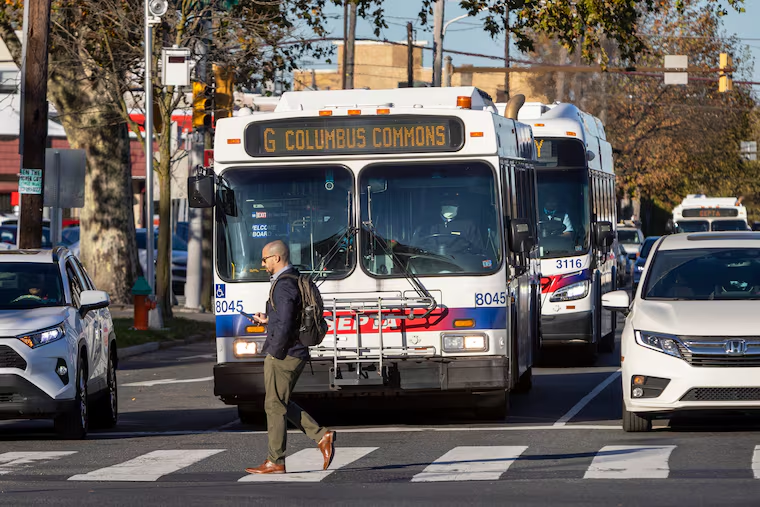SEPTA’s issues go deeper than Bus Revolution
Amidst the arguing over newly proposed bus routes, there are bigger problems to tackle, such as SEPTA's discriminatory fare system and its need to do better by its workforce.

On Monday, City Council will host a hearing about SEPTA’s controversial proposal for changes to bus routes. Although SEPTA is a state agency, its ridership is overwhelmingly from Philadelphia, and it’s promising that Council is taking an interest. The need for change is too great to leave to Gov. Josh Shapiro and the legislature alone.
Amidst the arguing over whether SEPTA’s proposed changes — called Bus Revolution — will shortchange riders in Southwest Philly, Roxborough, and other areas, Council members seem to understand that the agency’s problems go deeper than bus routes. Much of what is possible is going to depend on developing and funding bold plans to increase SEPTA’s ridership, and that means pressing for improvements systemwide. As Councilmember Curtis Jones Jr. said during a Council session last month: “If you kept SEPTA clean, you’d increase ridership. If you kept SEPTA safe, you would increase ridership. If you kept SEPTA reliable, you would increase ridership.”
The hearing has a lot of ground to cover. But among other changes that need to be made, it’s crucial that agency management reexamine its professional standards for outside contractors, become a better partner with its own workforce, and firm up its shaky commitment to transit equity.
» READ MORE: SEPTA bus riders want faster service, but many hate how their routes could change
A reassessment of the agency’s partnerships must begin with Conduent, the primary contractor for the troubled Key Card system. Throughout years of setbacks, SEPTA has continued to renegotiate the contract, making the project more and more expensive. Conduent, meanwhile, has kept stuffing its pockets with public money — all in spite of its checkered past. In 2017, the federal government fined the company more than $1 million over software errors that affected consumer data sent to credit agencies. Conduent’s mistakes extend to the present day; last year, a technical glitch briefly locked 1.8 million Pennsylvanians out of nutrition benefit programs. At this point, it’s hard to see the ongoing deal as anything other than a $239 million slow-motion, daylight heist — and it’s still in progress.
Despite this, SEPTA management is capable of a flinty negotiating style when it feels compelled. In 2021, the agency lowballed many of its own essential workers during contract negotiations, trying to force concessions from the same employees who made sure the agency survived the first wave of the pandemic. The settled contract was set to last just two years, meaning that negotiations are coming up again very soon. This time, SEPTA management should sign off on a fair contract without demanding concessions. Just as the agency should be pressed to do better by riders, it should be pressed to do better by its workforce. Council represents those workers, too.
Vetting contractors for quality and comportment matters; so does dealing fairly with workers. But the moment we’re in calls for changes that cut deeper. SEPTA management must commit itself fully to transit equity, ensuring all communities have access to great public transport that gets them where they need to go. A good place to start is by fixing its fare structure.
“Vetting contractors for quality and comportment matters; so does dealing fairly with workers.”
In 2019, the Pew Charitable Trusts released a study on the impact of SEPTA’s fare structure that showed, in part, that transfer fees hurt some neighborhoods more than others. Those neighborhoods hardest hit by transfer fees were also some of the most low-income, including parts of West and North Philadelphia and along the Kensington Avenue corridor. It should have spurred immediate change at SEPTA. It’s no mystery which transit riders live in West Philly, North Philly, and along Kensington Avenue, and the Pew study makes it clear that the fare structure amounts to de facto discrimination. Our city was shaped by structural racism; every agency that serves Philadelphia should strive to repair the damage done by this history. But SEPTA’s leadership hasn’t embraced even the most straightforward fix: an end to transfer fees.
City Council can confront these challenges at the hearing. It can ask what our representatives at every level should be asking: What is our public money funding? Are we helping the most — and the most vulnerable — people? If the answer to that question isn’t a good one, I hope our leaders will remember what a SEPTA executive told The Inquirer last year when asked about Conduent: “There are no blank checks.”
Matt Sullivan is a transit advocate in Philly.